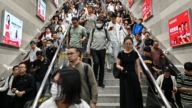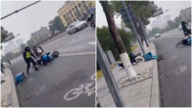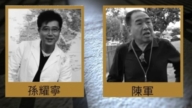【新唐人2012年12月01日讯】《纽约时报》最近有两篇报导,是对于中国电影审查标准提出质疑。事实上,在中国电影界这已经是一个老问题了。尤其是在中共十八大召开期间,权力交接的时刻,敏感的电影更是有意的被搁置。报导还说,这种审查只是让中国电影变得更平庸,无助于电影产业的发展。
原定于今年7月上映的电影《王的盛宴》,因为中共当局审查的关系,延迟到11月29号才开始公映。
《纽约时报》报导,这部电影被审查机构压了将近五个月,审查机关似乎不希望中国观众在11月中旬国家领导人换届之前,看到这部描写推翻秦朝暴政建立汉朝的电影。
据了解,《王的盛宴》剧情是描述两千年前的中国,秦王暴政,诸侯起义。当初在制片人和导演当中流传一种说法,就是在十八大结束之前,这部电影是不可能上映的。
原《河北人民广播电台》编辑朱欣欣:“中共是草木皆兵,神经过敏,它怕老百姓任意的想像,项羽是古代的历史故事我想它是不是联想到霸王盛宴之后就是一个灭亡,所以一直把这电影压到现在。其实正常上映大家不会如何如何,它一拖延反倒引起众多的猜疑跟联想。”
《纽约时报》报导还说,电影推迟上映反映了当今中国文化所面临的一个核心窘境。当局想以管理经济的方式来管理文化,持续干预使得文化陷入了极其尴尬的境地,审查让中国电影变得平庸。
朱欣欣:“其实在中国,电影审查一直没有一个专门像美国那样很严的电影审查的法律,所以中共政治权利按自己现实的需要,可以随意的任意的来对电影审查,所以导致中国无论电影还是其他方面,当然电影是最严格的,遭到一些审查,所以说中国没有好的电影,整体文化水准上不去,跟文化专制有很大的关系。”
而另外一部电影《神探亨特张》,描写北京警察追查诈骗犯的过程,顺利的在7月20号准时上映。有媒体质疑,《神探亨特张》是一部以“类记录片”的形式,实质是歌颂人民政府“英明伟大”的主旋律电影。
北京艺术家杨伟东:“我只是作为一个记录片的导演,我的困惑是什么呢?我现在拍一部片子,拍了近5年了,拍的过程中,警察因为我拍这个片子搜查了我的家,抄走了我的电脑,多次约谈我。2月份以后我的电话被断过,我的网线被断过,我们家门口出现过13个摄像头。”
杨伟东表示,他在拍记录片时受到来自公安的威胁。
北京艺术家杨伟东:“在今年4月18日限制我的离境,北京市通州市的警察的理由,就是因为我前期的采访包括这次的,出去会殃及到国家的政治的稳定和安全,我是艺术家,我的工作就是从事艺术,我的创作的工作会殃及到国家的政治 稳定和安全,我不知道为什么。”
杨伟东认为,在中国,一个艺术家创作的作品,一旦进去公共领域,这件作品本身已经和艺术家没有关系了,只能说创作条件是非常恶劣的。
采访/陈汉 编辑/黄亿美 后制/郭敬
New York Times: Censorship Causes the Chinese Movie
To Become Mediocre
“The New York Times” published two reports recently
which challenged the Chinese movie’s censoring standard.
In fact, it has hurt China’s film industry for a long time.
Especially during the Chinese Communist Party’s (CCP)
18th Congress, in which the CCP changed its leadership,
Films considered “sensitive“ have been shelved
at “sensitive“ times.
The reports also said that such censorship caused China’s
movie offering to be mediocre, and it will not help the industry’s growth.
A Chinese movie “The Last Supper" was originally
scheduled to be released in July this year,
but was postponed until November 29th,
after being censored by the CCP.
“The New York Times” reported that this film was blocked
by China’s censoring authority for almost 5 months.
The movie describes how the people overthrew the
tyranny of the Qin Dynasty and founded the Han Dynasty.
The censoring authority, it seems, didn’t want people
to see this film before the CCP leadership changeover in the middle of November.
The story of “The Last Supper” happened in China
2,000 years ago when the king of the Qin Dynasty was a tyrant, and the feudalists staged an uprising.
When the movie was undergoing production,
many producers and directors said that it couldn’t be released before the CCP ‘s 18th Congress.
Zhu Xinxin, the former editor of “Hebei People’s Radio”:
“Everything is the enemy in the CCP’s eyes.
It’s too nervous, and afraid of the imagination of the Chinese
people Xiang Yu is an overlord figure in Chinese history.
I think CCP may be worried that in the film the
overlord died after the feast. So it has blocked the film until now.
In fact, if the movie could be released normally,
people would not think about other things.
but the postponement has attracted attention
and aroused suspicion.
“The New York Times” also reported that the
postponement of the movie reflects a core dilemma that today’s Chinese culture faces.
The authority wants to use the control mode
Used in the economy to control culture.
Sustained intervention has forced culture into
a very awkward situation.
The excess of censorship has caused the Chinese movie
to be seen as mediocre.
Zhu Xinxin: “In fact, China doesn’t have a dedicated strict
movie censoring law like the one in the U.S.
The CCP censors the movie by its political desire,
which has caused the current movie situation in China.
Of course, the censoring of movies is stricter than
in other countries. That’s the reason why there are no good movies in China.
The whole cultural level can’t be improved mostly
because of the dictatorship on the culture side.”
At the same time, another movie “Detective Hunter Zhang”
was released on July 20 smoothly,
this movie describes the process of Beijing police
investigating and tracking fraudsters.
Some media questioned that “Detective Hunter Zhang”
uses a similar documentary format to propagandize the CCP government as wise and great.
Yang Weidong, a Beijing artist:
“As a documentary director, what’s my confusion?
The documentary I’m making now was started
nearly five years ago.
During the shooting, the police searched my home,
took my computer away,
and interviewed me several times
because of the documentary.
In February of this year, the police cut off my phone,
stopped my internet connection,
and installed 13 surveillance
cameras in front of my home.”
Yang Weidong said he was threatened by police
when he was shooting the documentary.
Yang Weidong: “On April 18 this year,
the police didn’t allow me to leave China.
The police from Tongzhou Beijing said my interviews’
contents may risk the stability and security of the country.
I’m an artist. My job is doing arts.
I don’t know how my creative work can threaten
the stability and security of the country.”
Yang Weidong thought, once a work of art enters the public,
the art itself has no relationship with the creator any more.
The creative environment in China is very harsh.






























